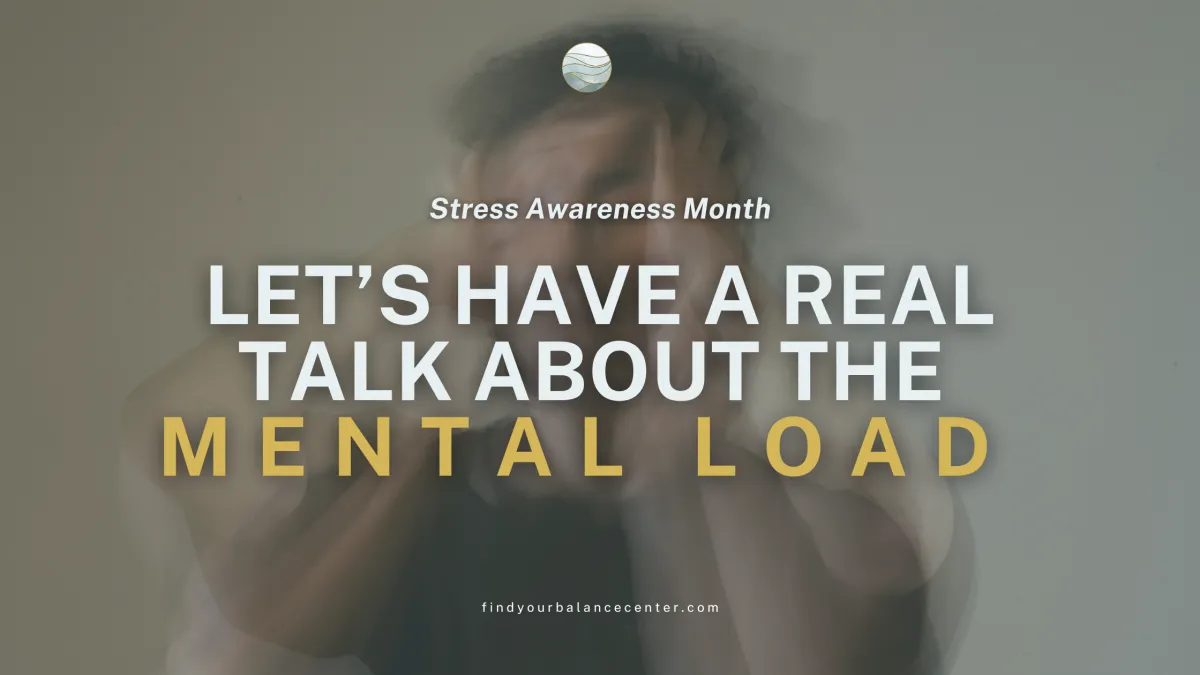
Stress Awareness Month: Let’s Have a Real Talk About the Mental Load
April marks Stress Awareness Month, a time dedicated to acknowledging the pervasive impact of stress on our daily lives. Have you ever heard of “The Mental Load”? It's the invisible, often unacknowledged cognitive and emotional labor involved in managing daily life.
In our fast-paced world, stress has become a familiar companion for many, impacting individuals of all ages and professions. Chronic stress not only takes a toll on our mental health but can also lead to serious physical issues such as heart disease, sleep problems, and a weakened immune system. It is essential to recognize the signs of stress and find effective ways to manage it, making sure we maintain our overall well-being in this busy era.
Recognizing and addressing stress is crucial for maintaining a balanced and healthy lifestyle:
Stress isn’t just a personal experience—it’s also shaped by culture, community, and lived realities. For BIPOC individuals, the pressure to stay strong, be everything to everyone, or keep going in the face of injustice can make it harder to slow down. But tuning into stress is essential to protecting your health and energy.
Pay attention to warning signs like fatigue, irritability, headaches, or trouble sleeping—these can be your body’s way of saying “slow down.”
Take short, regular breaks during the day to reset your mind and avoid burnout.
Use simple coping tools like deep breathing, stretching, or a quick walk to help release built-up tension.
Prioritize tasks and set boundaries with your time to reduce the feeling of being overwhelmed.
Create a culture of openness by checking in with yourself and others—normalizing conversations around stress helps reduce stigma.
Learn more about signs of chronic stress to understand what your body may be trying to tell you.
What Does the Mental Load Look Like?
The mental load can manifest in various ways, and it’s different for everyone. But for many, it involves:
Daily responsibilities. From organizing schedules and managing finances to planning meals and coordinating household tasks, it’s all on your mind.
Decision fatigue. The constant need to make decisions, big and small. From work choices to family matters, the mental energy it takes to make decisions throughout the day adds up.
Emotional labor. This is the work we do to manage and regulate our emotions in response to others. For example, you may be the one who comforts a friend in need or monitors how others are feeling.
Why Does the Mental Load Matter?
The mental load doesn’t just affect productivity—it impacts our mental and physical health. Studies show that carrying the mental load increases feelings of burnout, stress, anxiety, and even physical ailments like headaches or digestive issues. The toll it takes on our mental well-being can also lead to a breakdown in relationships or affect our ability to perform at work.
When the mental load isn’t managed, it can feel like you're stuck in a never-ending cycle of tasks, without enough time or energy for yourself. The chronic stress from the mental load can contribute to more serious health concerns, including anxiety and depression. Take Our FREE Anxiety and Depression Check-up and discover insights about your mental health!
How to Lighten the Mental Load
It’s time to take action. Here are some simple yet effective ways to lighten your mental load:
Delegate Tasks
Recognizing that you don’t have to do everything yourself is a game-changer. Whether it’s work-related tasks, household chores, or even planning family events, don’t be afraid to delegate. Share the load with others and be clear about your needs.Create Systems
Organize your life by creating systems that make your tasks easier to track. This could be as simple as using a digital calendar or creating to-do lists. The less mental energy you spend trying to remember everything, the better.Set Boundaries
Establish clear boundaries at work and home. Learn to say “no” when you're feeling overwhelmed, and prioritize what truly matters. Setting boundaries protects your energy and helps you focus on your well-being.Practice Self-Care
It’s easy to forget about taking care of yourself when you’re overwhelmed, but you can’t pour from an empty cup. Taking time to rest, practice mindfulness, or engage in a hobby you enjoy can help recharge your mental batteries. Mental Health America has great tips on self-care that can help reduce mental strain.Seek Support
If the mental load is becoming too much, it's okay to seek support. Talking to a therapist, a friend, or your supervisor at work, getting help is not a sign of weakness. Therapy can offer personalized strategies for managing stress and the mental load, allowing you to regain control of your mental space.
Find Your Balance, Center for Growth and Change offers accessible telehealth therapy for all across California.
We accept insurance, including Cigna, Health Net, Anthem, Aetna, Blue Shield, LA Care, Molina, IEHP, Magellan, and TriWest.
Meet our team of caring therapists or book a free consultation with us to see how we can support you in finding relief and balance.
Take Action Now
Stress Awareness Month is the perfect time to address the mental load and make small changes for a healthier mindset. Recognizing and acknowledging your stress is the first step, but it’s the consistent, everyday actions that make the biggest difference in managing the load.
Don’t wait until you’re burnt out! Taking small steps now can make a big difference in how you feel each day. Remember that mental health is just as important as physical health—by giving attention to your mind, you’ll be setting yourself up for a more balanced and fulfilling life.
Never miss an update! Get the latest on our services, mental health resources, and more. Subscribe here.
